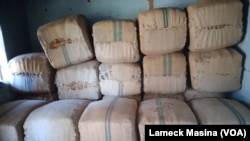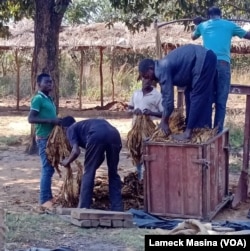Malawi's President Lazarus Chakwera has ordered police to tighten border security to control tobacco smugglers who sell the crop to neighboring countries for better prices. However, analysts and some farmers say tobacco smuggling would only stop if buyers offer competitive prices to farmers.
Tobacco is the main cash crop and major foreign exchange earner in Malawi.
Statistics from the Ministry of Agriculture show that the crop, also known in Malawi as "green gold," contributes about 60% to the country's foreign exchange basket. It also contributes about 13% to the country's gross domestic product.
Recent reports, however, show that almost 10% of the crop is smuggled to neighboring countries like Zambia and Mozambique for better prices.
One farmer, who bypasses Malawi's auction floors and asked not to be named for fear of reprisals, told VOA that they get double the profits from cross-border trading compared to selling in Malawi.
"Currently, tobacco prices at the auction floors in Zambia are averaged $5/kg for the highest quality leaf while the cheapest is $2/kg," he said. "While here in Malawi, the average price for the highest-quality leaf is $3.05 while the cheapest is $2.40/kg."
Another problem is that, among other costs of selling tobacco at Malawi auction floors, a lot of levies are charged on tobacco bales, he said.
These include seed and auction taxes as well as a fee by tobacco associations, he said. While in Zambia, he added, the only costs incurred have to do with transportation and auction levies.
Speaking during the opening of this year's tobacco marketing season Monday, President Lazarus Chakwera said tobacco smugglers bring down Malawi's efforts to earn much-needed foreign currency.
"To those of you who are doing this, I will not spare you," he said. "The inspector general of police who is already here, please tighten security in all areas where people are doing this illegal business. Such people should be arrested."
Chakwera said his government recently negotiated with tobacco buyers to offer better prices to farmers this year to curb tobacco smuggling.
Some farmers who sold their crops at the start of selling season Monday said they were happy with the prices offered by the buyers. Others said such has been the trend in the past and the prices drop when the marketing season picks up.
Adam Chikapa, an economist based in Blantyre, said arresting tobacco smugglers cannot end the illegal malpractice which has been there for decades. Previous attempts, he said, have changed nothing. "So the solution in this case, should be just creating conducive environment in terms of the sales that the farmers are making by giving them good prices"
Chikapa said it's time Malawi reduce relying on tobacco for foreign exchange, citing falling demand following anti-smoking campaigns championed by the World Health Organization and the proven link between tobacco use and cancer.
"We need now to embark on the production of other crops that are highly demanded outside there," he said. "We have got industrial hemp, even legumes."
Parliament recently passed legislation to permit cultivation of marijuana or cannabis as an alternative to tobacco farming.
The lawmakers said cannibis — if grown full scale — is expected to earn Malawi as much as $700 million per year, more than double the foreign exchange it gets from the sale of tobacco.





